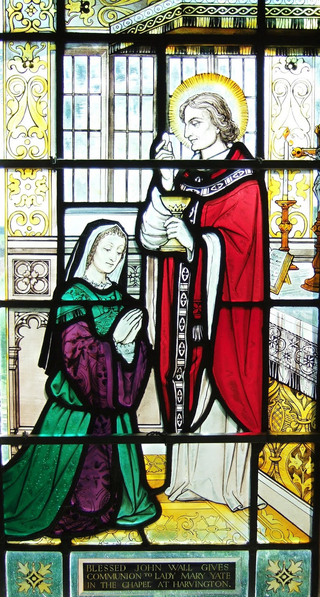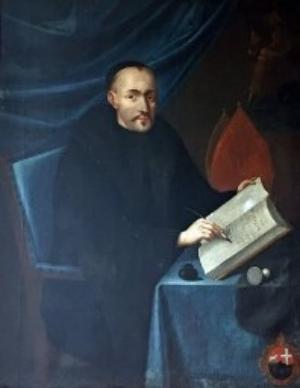Related Research Articles
Thomas Walsingham was an English chronicler, and is the source of much of the knowledge of the reigns of Richard II, Henry IV, Henry V and the latter reign of Edward III depicting the decline of the state of affairs of the English. He also documented the careers of John Wycliff and Wat Tyler.

John Wall,(aliases John Marsh, Francis Johnson or Dormore or Webb, religious name "Joachim of St. Ann") was an English Franciscan friar, who is honoured as a martyr by the Catholic Church. Wall served on the English mission in Worcestershire for twenty-two years before being arrested and executed at the time of Titus Oates's alleged plot.

The Senate House is a 1720s building of the University of Cambridge in England, used formerly for meetings of its senate and now mainly for graduation ceremonies.

The English Benedictine Congregation (EBC) is a congregation of autonomous abbatial and prioral monastic communities of Catholic Benedictine monks, nuns, and lay oblates. It is technically the oldest of the nineteen congregations affiliated to the Benedictine Confederation.
Wallingford Priory was a Benedictine priory dedicated to the Holy Trinity in Wallingford in the English county of Berkshire. Nothing remains of Holy Trinity Priory, which is believed to have stood on the site of the Bullcroft recreation ground off the High Street.
John Adams D.D. (1662–1720) was an English churchman, and provost of King's College, Cambridge.
Joshua Bassett or Basset was an English academic, Master of Sidney Sussex College, Cambridge under James II.

Alban Roe was an English Benedictine priest, remembered as one of the Forty Martyrs of England and Wales.

Lamspringe Abbey is a former religious house of the English Benedictines in exile, at Lamspringe near Hildesheim in Germany.
Maurus Corker was an English Benedictine who was falsely accused and imprisoned as a result of the fabricated Popish Plot, but was acquitted of treason and eventually released.
William Holmes D.D. was an English academic, Vice-Chancellor and Regius Professor of Modern History of the University of Oxford. He was also Dean of Exeter between 1742 and 1748.
John Peachell (1630–1690) was an English academic, Master of Magdalene College, Cambridge, and Vice-Chancellor of the University of Cambridge at the moment when James II was aiming to impose his will on the universities.
Edmund Boldero (1608–1679) was an English royalist clergyman and academic, Master of Jesus College, Cambridge from 1663.
Edmund de Bromfield was an English Benedictine who became bishop of Llandaff.
Francis Fox (1675–1738) was an English divine who became vicar of Reading.
An election for the Chancellorship of the University of Cambridge was held on 25–27 February 1847, after the death of the Duke of Northumberland. Many senior figures in the university hoped that Prince Albert could be persuaded to stand and be elected unopposed, but a group from St John's College approached the Earl of Powis, a St John's man. The election became politicised as Powis was a noted Conservative and his opponents feared the consequences from the Whig Government if he was elected. The result was close as the large number of non-resident Members of the Senate from St John's, and Conservative supporters, backed Powis, but the Prince was elected and agreed to take up the post. The election occurred at a critical point in the history of the University when it was pressed to reform, and Prince Albert's election allowed progress to be made.

Clement Reyner D.D. (1589–1651) was an English Benedictine monk, who became abbot of Lamspringe in Germany.

James Grahme or Graham (1649–1730) was an English army officer, courtier, politician who sat in the English and British House of Commons between 1685 and 1727. After the Glorious Revolution he was involved for ten years in Jacobite schemes and plots.

John Balderston was an academic at the University of Cambridge, master of Emmanuel College and twice vice-chancellor of the university.
John Jones, also known as Leander à Sancto Martino, was a Welsh Benedictine monk.
References
- ↑ Ralph Weldon, A Chronicle of the English Benedictine Monks, App. p. 24
![]() This article incorporates text from a publication now in the public domain : "Francis, Alban". Dictionary of National Biography . London: Smith, Elder & Co. 1885–1900.
This article incorporates text from a publication now in the public domain : "Francis, Alban". Dictionary of National Biography . London: Smith, Elder & Co. 1885–1900.